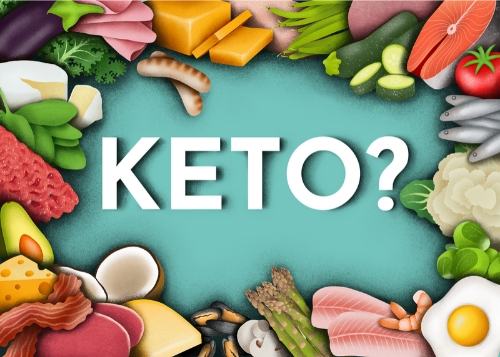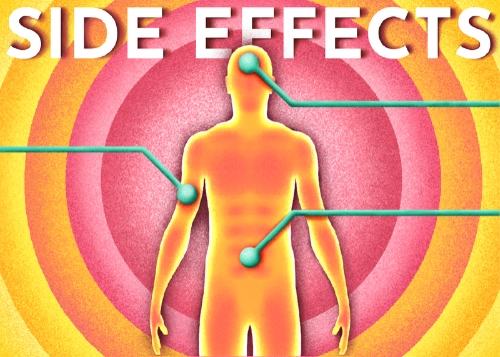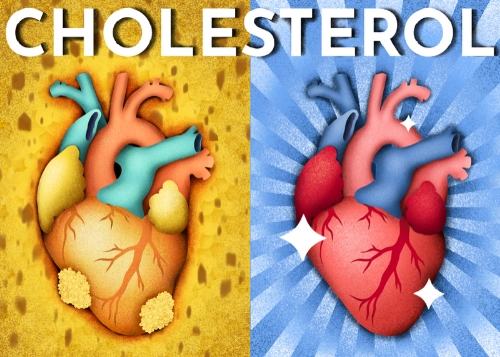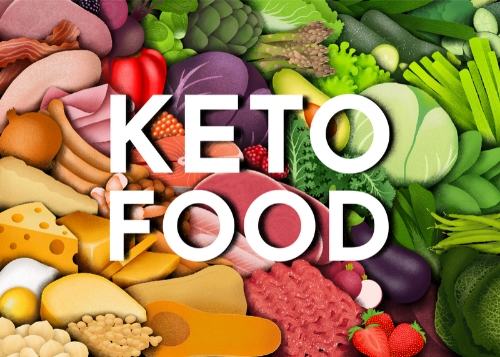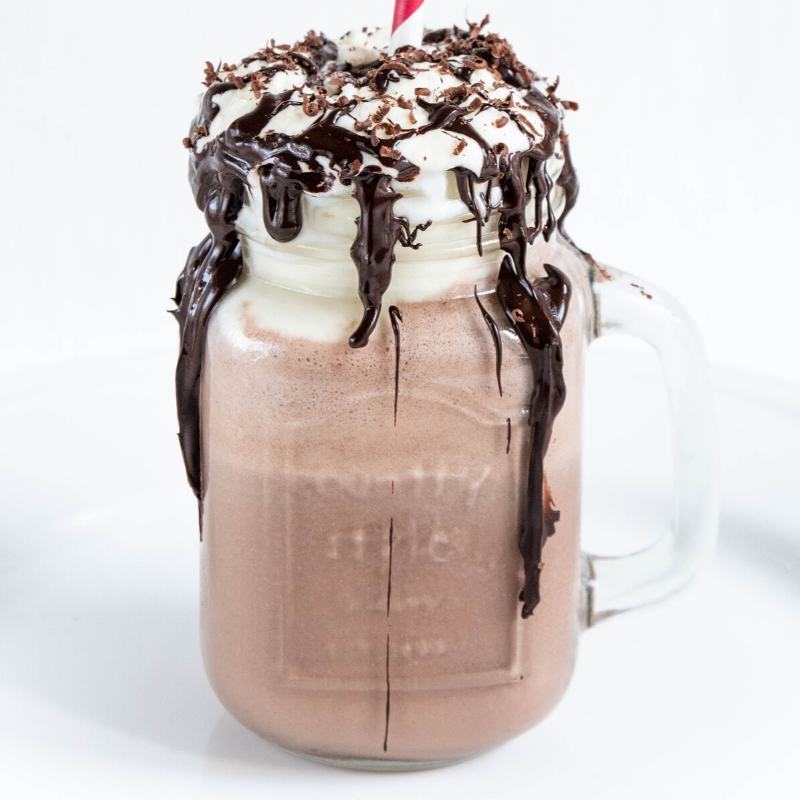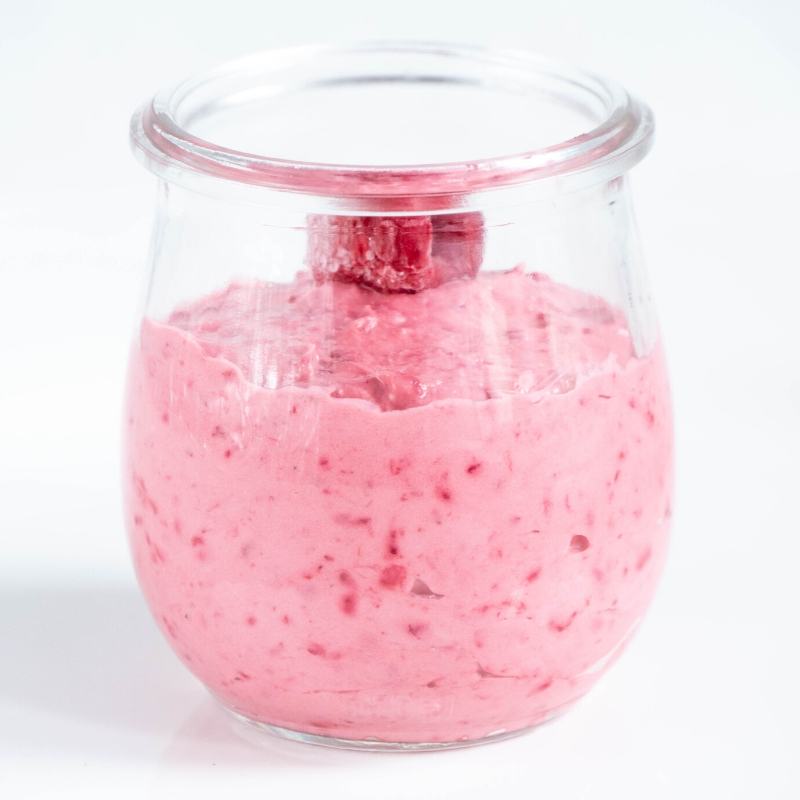Why the Keto Diet Works: Its Effect on Your Hormones Explained
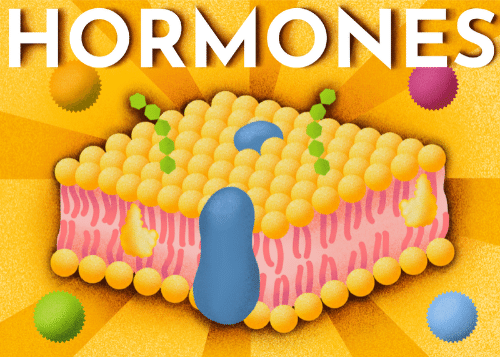
In a nutshell:
- “Eat less, move more” usually only works in the short term and almost always leads to the so-called yo-yo effect.
- One reason why conventional diets fail so often is their adverse effect on our weight-regulating hormones.
In the long run, the negative impact on these hormones will cause us to regain the weight we have lost, if not more. - In contrast to conventional diets, the ketogenic diet has a positive effect on our weight-regulating hormones.
If you can control the hormones that are responsible for weight gain, hunger, and satiety, you will have a much easier time losing weight.
It’s such a simple solution.
And yet, over 70% of the American population is overweight and almost 40% are obese – numbers that are expected to rise even more.
We want to show you that this alarming statistic is not based on a lack of willpower.
Everything in our body is regulated by hormones, including our weight.
Learn how following a ketogenic diet can help to positively influence your weight-regulating hormones so that you can finally lose that weight one last time – without being hungry all the time or exercising non-stop.
The content provided in this post is for informational purposes only and does not constitute medical advice. It is not intended to replace professional medical advice, diagnosis, or treatment. See further information.
1. Why “normal” diets don’t work
It shouldn’t make a difference whether we consume 100 calories from broccoli or 100 calories from gummy bears – 100 calories are 100 calories after all.
If we subsequently burn these 100 calories during exercise, this should also have no effect on our body whatsoever.
This theory is based on the first law of thermodynamics, which states that energy can neither be created nor destroyed in an isolated system.
This law of physics should apply to the human body just as well as to any other isolated system on the planet.
Except that it doesn’t.
The human body is not an isolated system
The laws of physics tell us that energy can neither be created from nothing nor destroyed, it can only be converted from one form to another.
Thus, ingested calories can only take one of two paths in our body: they are either burned during physical activity or converted to fat.
However, this assumption is confusing our complex biological system with an isolated system.
Our daily basal metabolic rate, i.e. the calories we burn throughout the day without doing anything, depends on dozens of other factors, most of which we cannot consciously control.
Examples are the production of body heat, the repair of muscles or bones, and brain function.
This means that the calories we consume do not necessarily have to be burned or stored, they can also be used by our body in other ways.
This doesn’t mean that the first law of thermodynamics is wrong, it just means that the human body is not an isolated system and the law is thus, not as relevant for our weight loss goals as we thought it was.
Calorie intake and calorie expenditure are not independent of each other
This assumption is also wrong as your body is always striving to maintain a certain balance, called homeostasis.
As a result, your body reacts to an increased calorie intake by burning more calories.
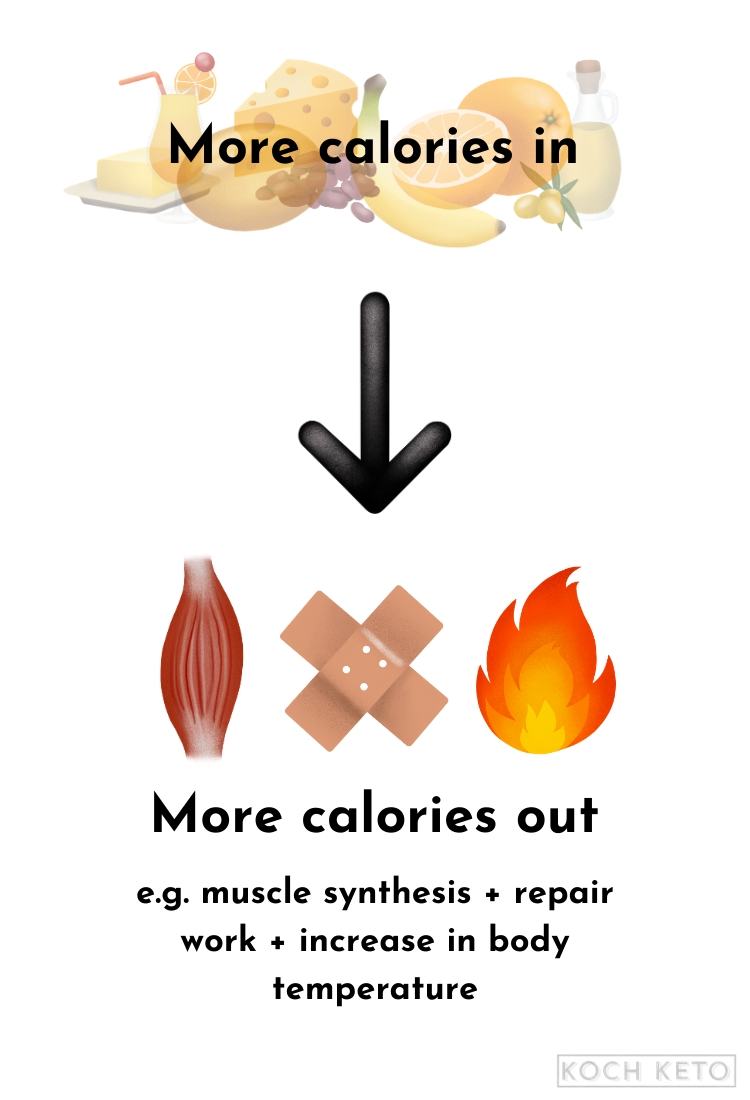
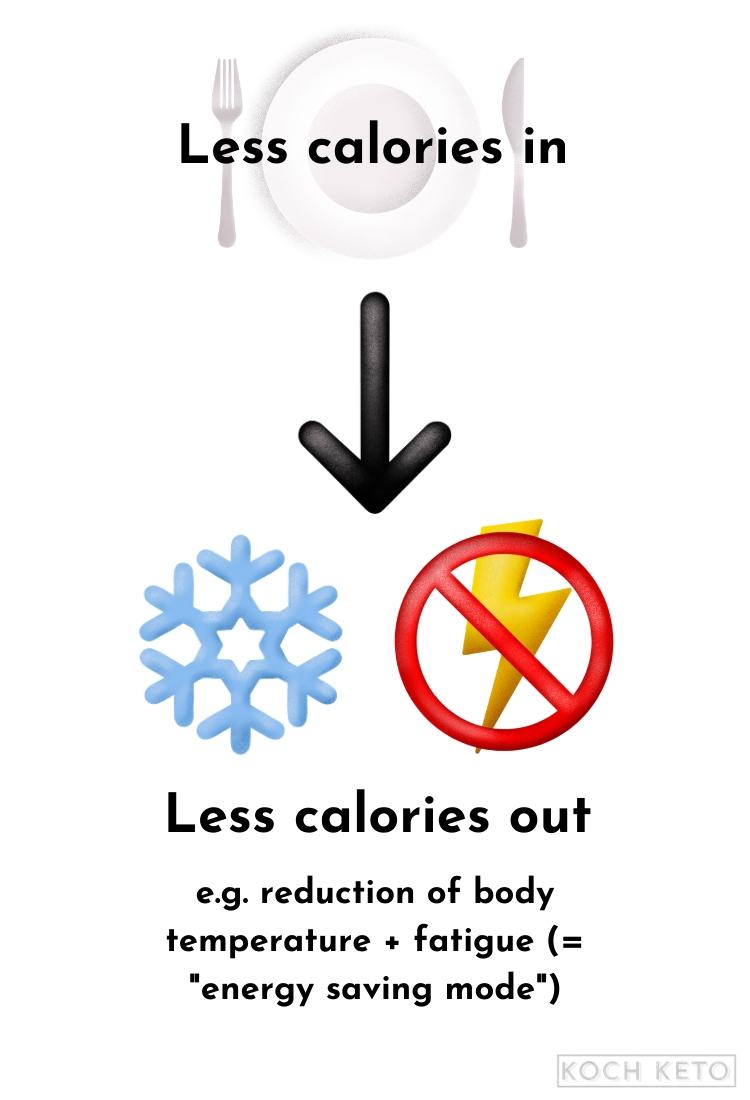
If you suddenly reduce your calorie intake, your body initially reacts by burning off some of its excess fat reserves.
Your diet seems to work and you maintain your reduced calorie intake to get rid of the remaining body fat.
However, after a couple of months the reduction in calories that caused you to lose the weight initially does not seem to be enough anymore and you stop losing weight, even though you still have plenty of body fat left.
No matter how much you exercise or how much you cut your calories, your weight continues to plateau.
Frustration creeps over you and you return to your old diet and with it your lost pounds.
Your body has won this battle and is already preparing for the next round of this never-ending cycle.
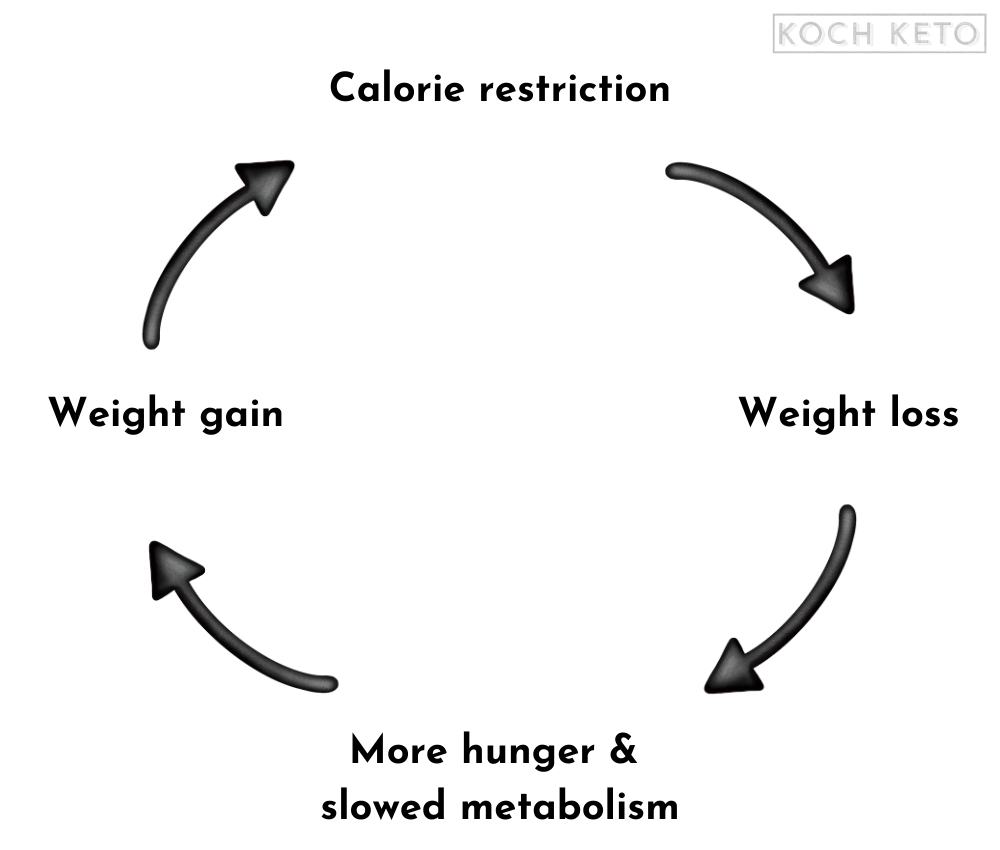
How conventional diets slow your metabolism
It accomplishes this by lowering your daily basal metabolic rate.
It reduces the production of body heat, it reduces brain function and it also ensures that you do not “waste” additional energy in the form of physical activity.
This results in you becoming cold, moody, and lazy after following a diet – sounds familiar?
This reduced basal metabolic rate persists for up to a year, making it even harder for you to lose weight the next time and even easier to regain weight that you’ve lost.
The never-ending cycle continues.
Summary:
- Conventional diets will usually fail because they are based on assumptions that are not correct.
- For example, the first law of thermodynamics is of little relevance for the human body, as it is not an isolated system.
- In addition, calorie intake and calorie expenditure are not independent of each other: if the calorie intake is reduced, the body reacts by reducing its energy expenditure.
2. Why exercise doesn’t work
Contrary to expectations, an increase in physical activity does not lead to significant weight loss.
Exercise is healthy, but it will not help you lose weight.
Calories burned during exercise are compensated elsewhere
One way your body can compensate for the extra calories burned during exercise is by making you save those calories elsewhere.
When comparing children who have physical education lessons in their school with children who do not have physical education lessons, you would expect the children with the PE lessons to move more overall.
But this is not what happens, instead, the activity levels of both groups do not differ.
If the children had physical education lessons at school, they spent less time moving around at home.
The children, who did not have physical education lessons, would move more as soon as they were at home.
In addition and contrary to popular belief, Americans are actually engaging in more physical activity than they did before, yet the percentage of overweight and obese people continues to rise relentlessly.
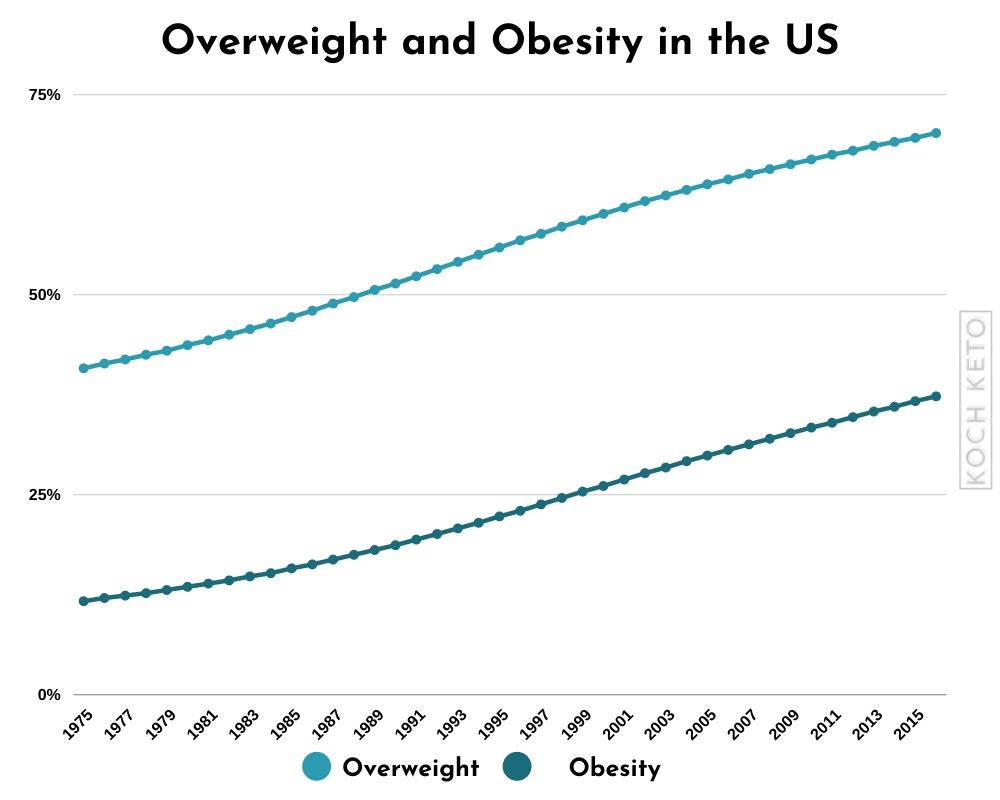
Exercising makes us hungrier
Summary:
- Exercise is healthy, but a large body of research shows that it is ineffective as a weight loss strategy.
- If we increase our physical activity, our body will react with an increased feeling of hunger and it will try to make us “lazier” in other areas of our life to make us compensate for the increased energy expenditure.
3. How hormones regulate our weight
Among other things, they control our behavior, our growth, and our weight.
A variety of hormones influence our weight by making us store fat easier, making us hungrier faster or by reducing our satiety.
Insulin: Our “fat-storage hormone”
The main function of insulin is to transport energy in the form of sugar from our blood into our cells.
Once inside the cell, the sugar can either be used as energy immediately or it can be stored as fat for later.
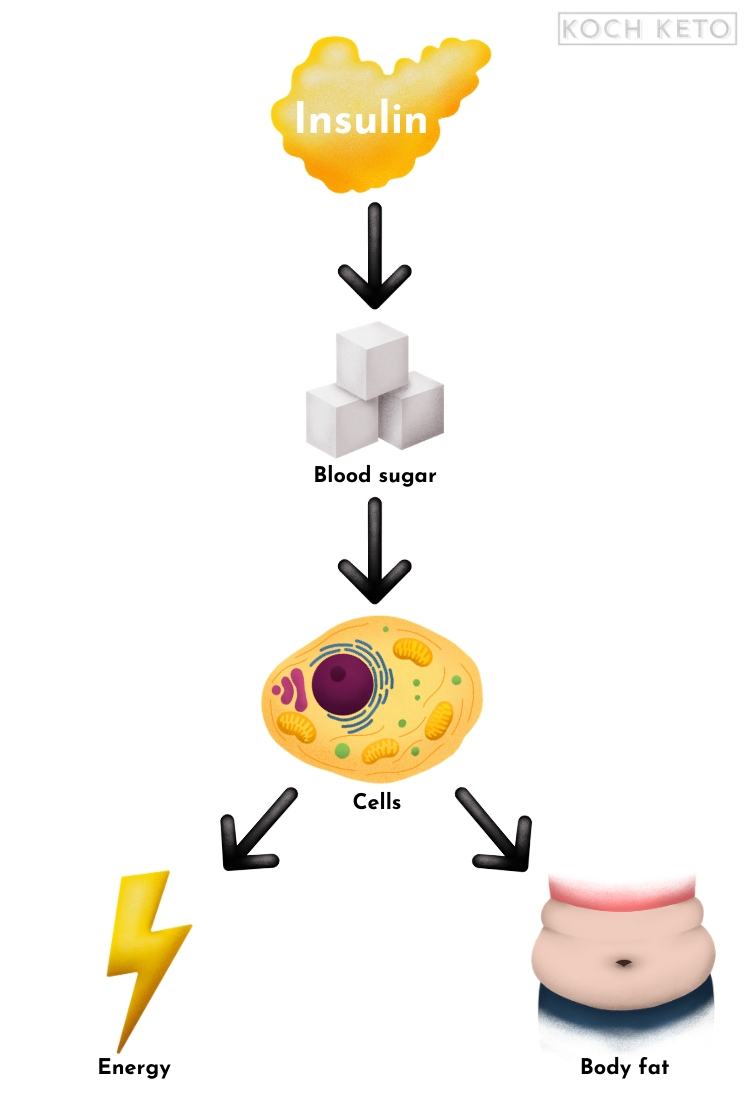
How important insulin truly is can be seen in the example of type 1 diabetics.
Patients with type 1 diabetes lose the ability to produce insulin due to an autoimmune response against certain cells in the pancreas.
If no insulin is present, the body can no longer transport energy into the cells.
The cells famish, even though there is sufficient energy intake in the form of food.
Without medical intervention in the form of insulin injections, diabetes type 1 is always fatal.
Too much of a good thing
But in the same way that too little insulin ensures that the affected patients can no longer store fat and become thinner and thinner, too much insulin has the opposite effect.
If we secrete too much insulin or receive it in the form of medication, we get fat.
At the same time, a high insulin level makes it next to impossible to lose the weight gained, since it blocks our fat burning process.
In some cases, this process even seems to be independent of how many calories are consumed.
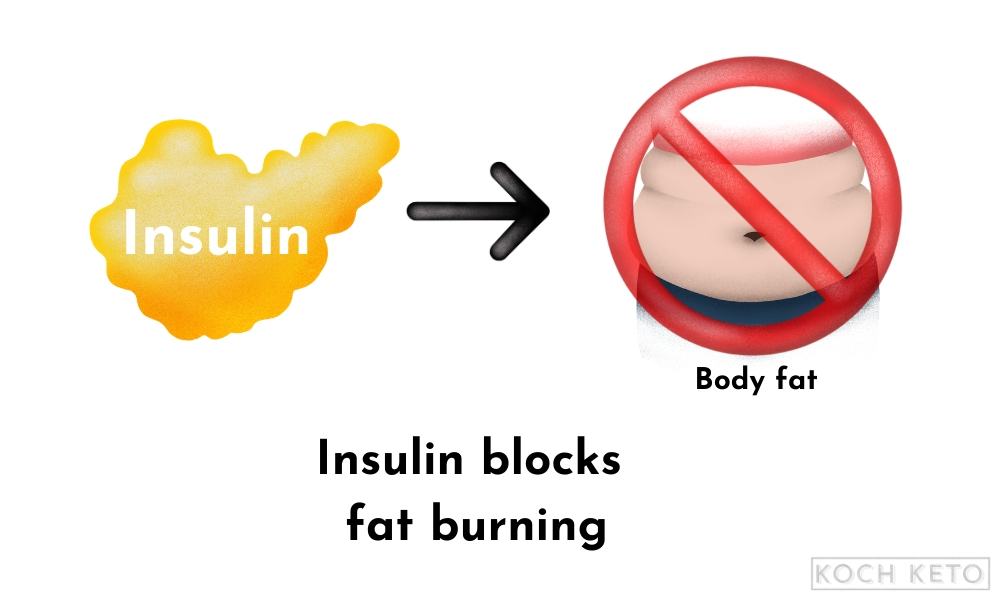
Examples for the effects of insulin
Summary:
- The hormone insulin is responsible for transporting energy in form of sugar from your bloodstream into your cells.
- A low insulin level is the key to successful weight loss, as insulin makes us store fat and at the same time blocks fat burning.
Leptin: Our bodys own scale
The more body fat we have, the more leptin we produce and vice versa.
Leptin basically works like a build-in scale.
Low levels of leptin tell our brain that we are running low on fat reserves and that we are probably going through a hunger period.
As a reaction to the low amounts of leptin, our brain takes measures to increase our fat reserves, for example by increasing our appetite and conserving energy by reducing our body heat.
A normal or slightly increased level of leptin tells our brain that there are sufficient fat reserves available and that they can be liberally used as an energy source.
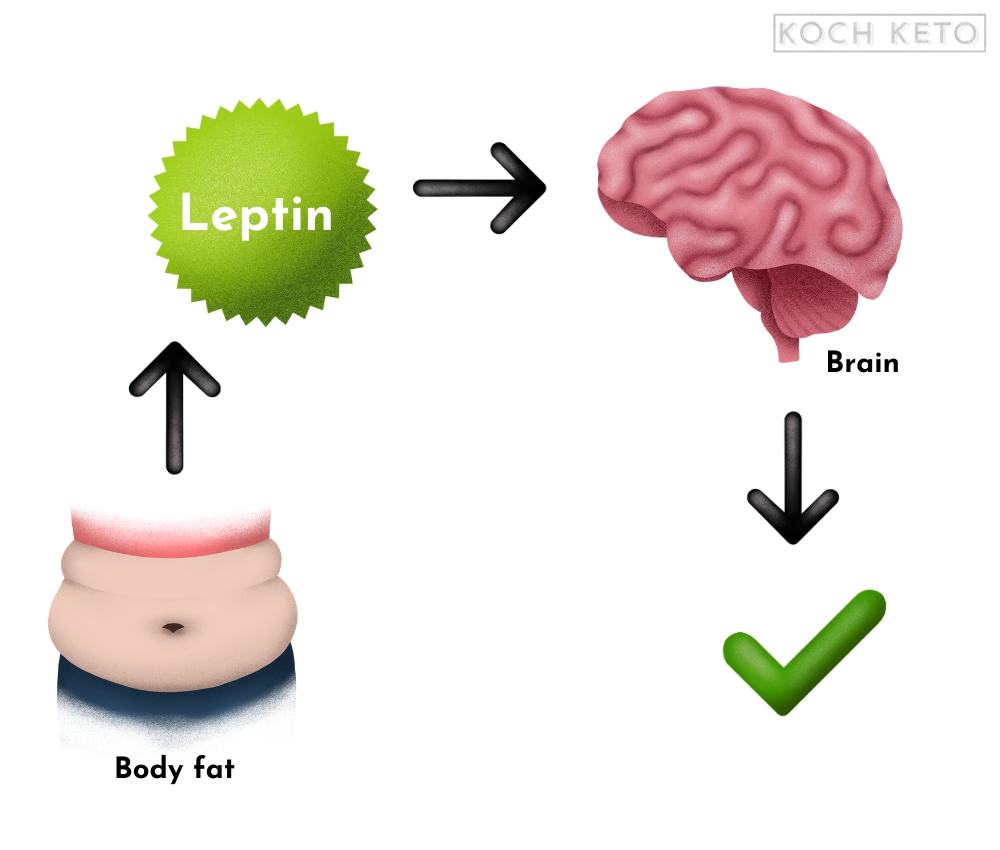
The brain of people who are obese is leptin-resistant
Instead, the brain reacts as if the body is going through an acute period of hunger, even though it could easily tap into the hundreds of thousands of calories stored in its own body fat.
The body is flooded with leptin, but the brain seems to be unable to see it.
So leptin itself is not the problem – leptin resistance is the problem.
What causes leptin resistance?
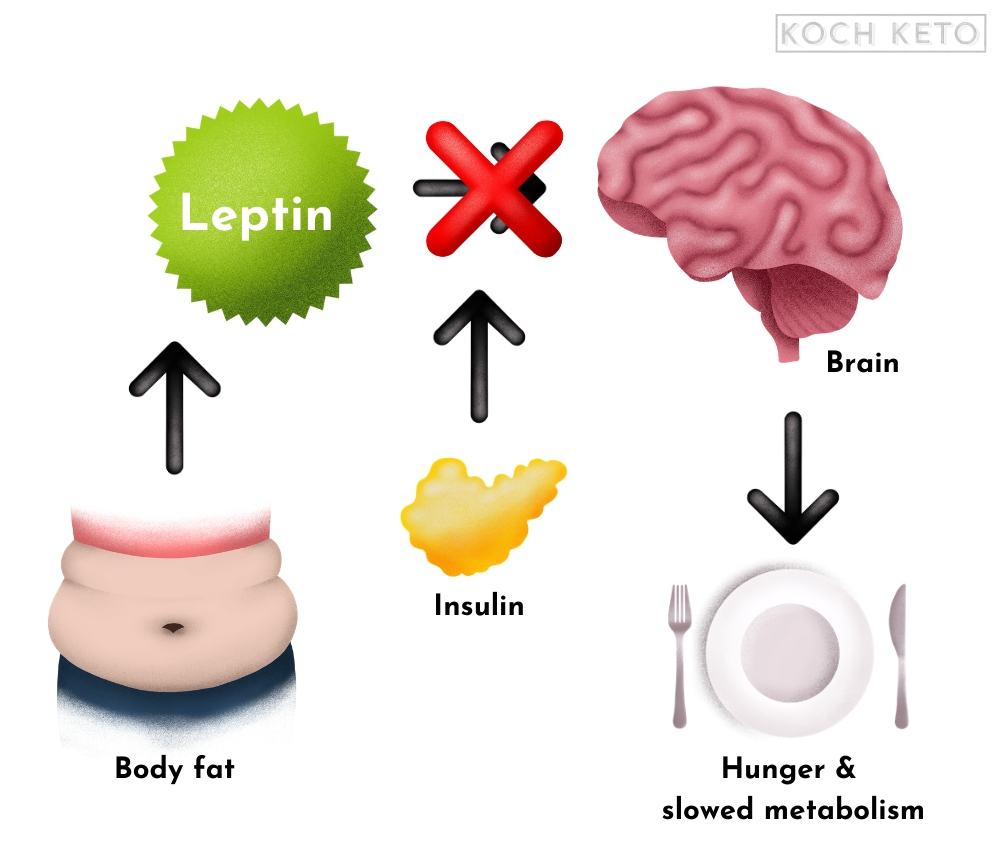
Examples for the effects of leptin
And even though the mice behaved as if they were starving to death, they quickly became obese.
Leptin injections quickly normalized the weight.
Through daily leptin injections, the affected patients quickly manage to lose weight and begin to engage in physical activity.
Summary:
- Leptin is produced by our fat cells and the amount of leptin directly correlates to the amount of fat reserves we have at our disposal.
This signals to our brain how much energy we have stored in our own body. - High insulin levels appear to block leptin signals in the brain and could, therefore, contribute to the development of leptin resistance.
If the brain is leptin-resistant, it reacts as if the body is starving even though there are plenty of fat reserves available.
Cortisol: Our “stress hormone”
One of its jobs in situations like that is to make sure that we have enough energy at our disposal to run quickly and hopefully escape that lion.
Cortisol does this by increasing the amount of sugar in our bloodstream so that it can be quickly burned as energy.
This in turn increases the level of insulin, as insulin is responsible to get the sugar out of the bloodstream and into the cells.
Chronic cortisol secretion leads to weight gain
But in our stressful modern world, where cortisol is released constantly in non-life-threatening situations, it sadly has the opposite effect.
Thanks to its effect on our insulin levels, the chronic release of cortisol leads to weight gain and the increase of a particularly harmful type of fat, the visceral (“beer belly”) fat.
Visceral fat builds up mainly around the abdomen and organs and is strongly linked to a lot of negative health consequences like heart disease, diabetes, high blood pressure, and more.
Examples for the effects of cortisol
Affected patients suffer from a seemingly inevitable weight gain with very typical characteristics, that can also be observed during treatment with the drug cortisone: the “moon face” and a particularly high accumulation of fat in the abdominal area.
Summary:
- Our body releases cortisol in stressful situations.
- Chronic stress and thus chronic cortisol secretion can lead to weight gain, due to its effect on our insulin levels.
Ghrelin: Our “hunger hormone”
The choice of our food can have an impact on our “hunger hormone” ghrelin.
If you eat foods that are rich in protein and fat, your ghrelin levels will be suppressed for quite a while and will rise slowly after you’ve finished the meal.
If you eat a meal rich in carbohydrates instead, you’ll experience a “rebound effect” – the level of ghrelin will drop significantly at first, but will then shoot up again very soon after you’ve finished eating.
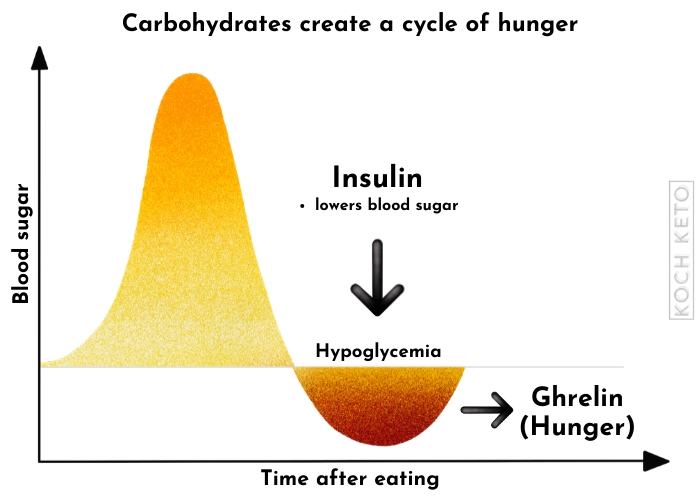
Conventional diets lead to a long-lasting increase in ghrelin levels
Even a year after the initial weight loss, higher levels of ghrelin and thus hunger could still be measured.
This means you will be measurably hungrier after successfully following your diet and losing weight and will thus have lower chances of keeping the weight from creeping back up.
Summary:
- Carbohydrates have a negative affect on ghrelin, our hunger hormone.
Following a high-carb meal, ghrelin will “rebound” quickly and thereby ensure a vicious “cycle of hunger”.
Our satiety hormones
But just like with ghrelin, the choice of our food matters and affects the way we release these satiety hormones and how satisfied we are after a meal.
The number of calories does not necessarily determine how satiated we are, as highly processed carbohydrates do not seem to send any satiety signals to the brain, despite their high calorie count.
Fat and especially protein, on the other hand, trigger the release of large amounts of satiety hormones.
Conventional diets reduce satiety hormones long-term
They too will not have returned to their baseline level even a year after the initial weight loss.
This means if you lose weight following the standard advice of “eat less, move more” you’ll not only reduce your hunger hormone long-term and will be hungrier after you started, you’ll also be less satisfied after meals.
Overweight people release less satiety hormones
Summary:
- Highly processed carbohydrates release little to no satiety signals, even though they contain plenty of calories.
- Fats and especially proteins release large amounts of satiety hormones.
If you control your hormones, you control your weight
In the body of an obese person, powerful hormonal mechanisms work against permanent fat loss, which will always triumph over pure willpower.
An increased insulin level ensures that the body constantly stores fat and inhibits the breakdown of fat.
Elevated levels of cortisol lead to increased blood sugar levels and in turn to increased insulin levels, which again leads to more fat being stored and the inhibition of fat breakdown.
Leptin resistance causes the brain to think that the body is starving and it reacts by initiating energy-saving measures such as lowering the basal metabolic rate and increased appetite.
Poor food choices lead to a vicious cycle of hunger thanks to constant spikes of ghrelin, our hunger hormone.
A lower baseline of satiety hormones leads to increased food intake.
Hence, in order to achieve lasting weight loss we have to regulate our hormones and not just obsessively count calories.
Because if you can control your hormones, everything else will fall into place.
Find out how a low carb or keto diet can help to regulate your hormones and thereby help you to lose the weight once and for all in the next section.
Summary:
- Hormones like insulin, leptin, cortisol or ghrelin have a huge impact on our weight.
- Therefore it is important to regulate these hormones if you want to lose weight and keep it off.
4. Why keto & low carb work: The effect on our hormones
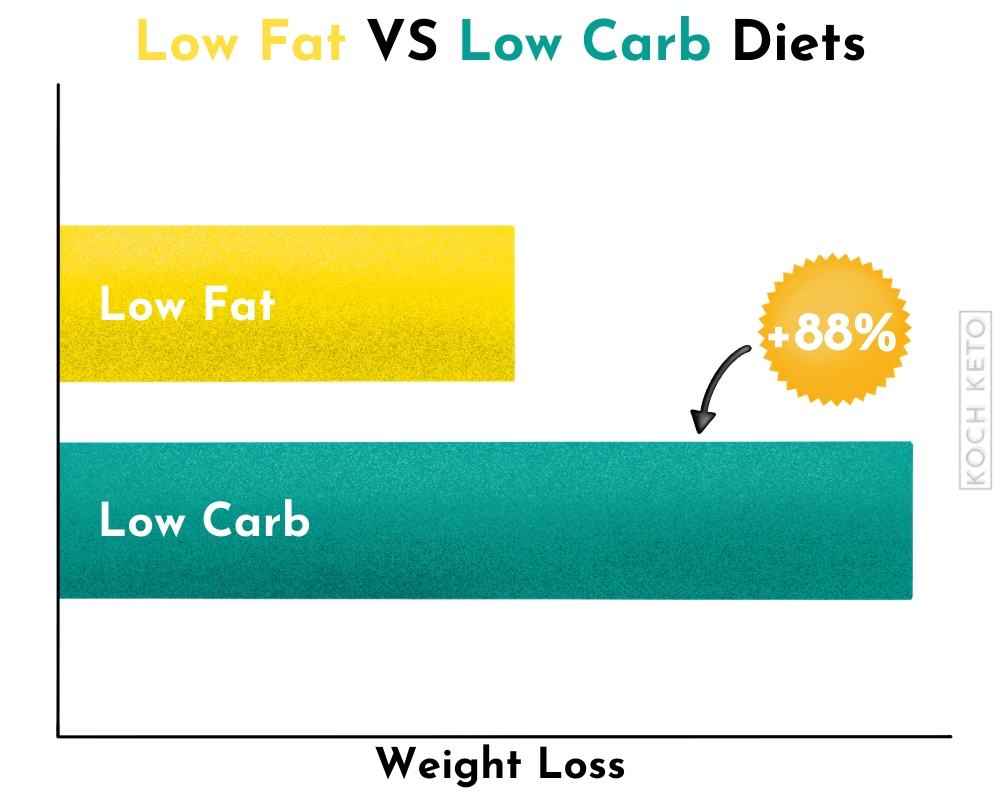
It is not only our insulin level that is improved by low carb and keto diets.
Other key hormones such as ghrelin will also be kept in check and improve your chances of losing weight successfully.
Low carb and keto help reduce your insulin levels
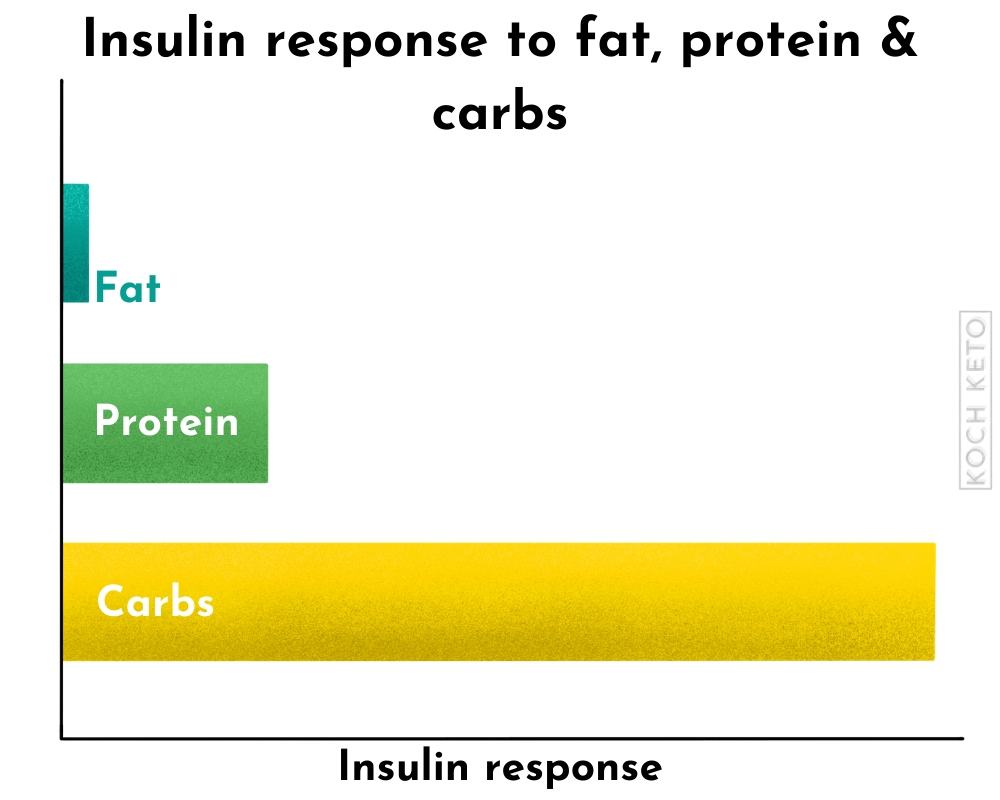
It is not only responsible for supplying your cells with energy, but it also blocks the breakdown of fat and affects other hormones relevant to your weight, such as ghrelin and leptin.
This means that if you manage to control your insulin, all other relevant hormones and your weight will most likely follow suit.
Your food choices have a great effect on your insulin levels.
Carbohydrates have by far the biggest impact on your insulin levels, followed by proteins, that can also release some insulin and then fats, that have almost no impact on insulin levels.
So if you follow a ketogenic diet or low carb diet (low carb + high fat and protein), you will automatically reduce your insulin levels.
Your body is now able to access your body fat reserves whenever it is needed since fat breakdown is no longer blocked by insulin.
In addition, other important hormones will also be affected by lower insulin levels and will also help you to lose weight.
Low carb and keto help with leptin resistance
The resulting leptin resistance causes our brain to think we are starving even though we have sufficient body fat reserves.
If insulin levels are reduced, leptin can signal the brain again that there are sufficient fat reserves and that they can be burned as needed.
Low carb and keto can reduce your insulin levels and can, therefore, help to counter leptin resistance.
Low carb and keto reduce hunger hormone ghrelin
This makes it difficult to go more than 2-3 hours without food and constant snacking is often the result.
Meals rich in fats and proteins lower our hunger hormone for a long time and do not lead to the same “rebound effect” as carb-heavy meals.
If you are in ketosis, you are actually releasing less of the hunger hormone ghrelin overall.
On top of that, weight loss achieved with a ketogenic diet does not cause the long-term increase in hunger hormone levels observed with conventional diets!
Low carb and keto increase satiety
Also, a low carb diet will be more satiating overall as fats and especially proteins release large amounts of satiety hormones, while highly processed carbs, in particular, don’t send any satiety signals to our brain.
Low carb and keto have a positive influence on our hormones and can help us to lose weight
Still, “normal” diets, which are mostly low-fat and only pay attention to calories, are inferior in almost every aspect if compared to low carb diets.
Because thanks to the effect of low carb on our hormones, you can lose weight without starving yourself, without permanently lowering your satiety hormones and without the notorious yo-yo effect.
Low carb and keto allow you to work with your body rather than against it when losing weight.
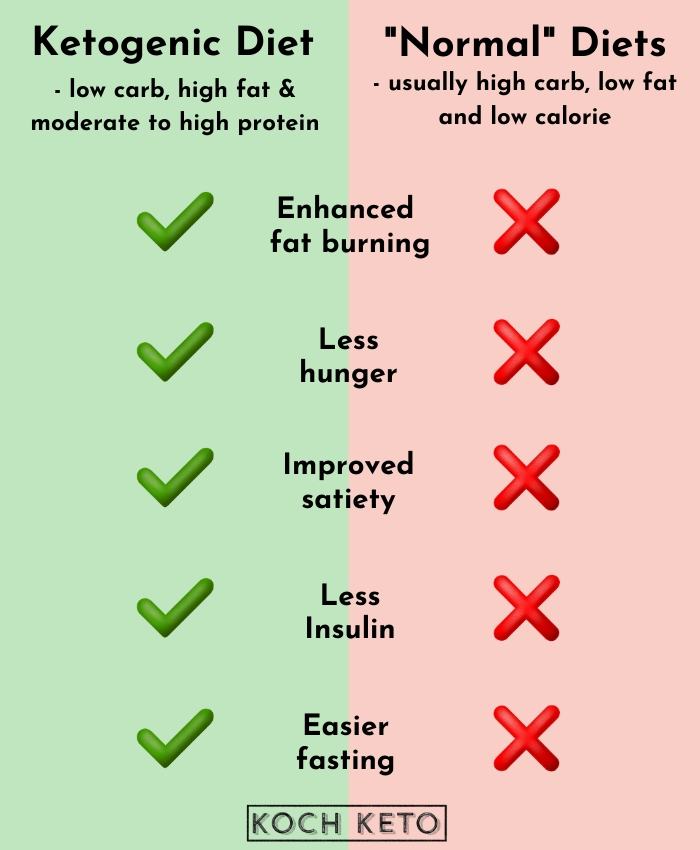
Summary:
- More than 20 controlled studies confirm: Low carb diets are more effective for losing weight than low-fat diets.
- A low carb diet has a positive effect on the hormones that are responsible for our weight.
- The positive effect on our insulin levels, our hunger hormone, our satiety hormones and more helps us to lose weight without starving ourselves and without falling victim to the yo-yo effect.
FAQ’s
What is insulin and what function does it have in our body?
The main function of insulin is to transport energy in the form of blood sugar from the bloodstream into the cells.
What is leptin?
What is the role of ghrelin?
How do you lower ghrelin?
A low-carbohydrate diet with plenty of fat and protein can, therefore, lower your hunger hormone ghrelin.

